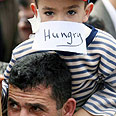
Demonstrations in PA
Photo: AFP
The Palestinian Authority appears to be facing a major humanitarian crisis because donors are withholding funds from the Hamas-run government. Unsurprisingly, the story is actually far more complex.
A widely circulated assumption has been that Abbas, in control of the Palestinian Investment Fund (PIF), from which USD 200-300 million might be drawn, is blocking release of these funds to weaken Hamas.
The PIF was established in 2002, when then PA Finance Minister Salam Fayyad seized a portion of Yasser Arafat’s ill-gained assets. After the Hamas victory, Abbas’s office announced that he was assuming direct control of the PIF. Today the Fund, worth some USD 1 billion, is not controlled by the new Hamas cabinet. However, information as to whether Abbas truly controls the Fund is murky. CEO Muhammad Mustafa says the PIF has already transferred close to USD 300 million to the PA. His implication is that no more will be forthcoming.
Contacts with solid information – all speaking off the record – describe the current PA fiscal crisis as political or “artificial” in nature. Mustafa seems to agree. There are other PLO holdings – of considerable magnitude – Abbas would be able to draw upon.
Accountability?
The PA, until recently, was receiving more international money per capita than any other political entity, but large sums were diverted for illicit purposes. In February, PA Attorney General Ahmed al-Meghami reported that he had uncovered the theft or misuse of USD 700 million within the PA and suspected that billions were involved.
During the years when these irregularities were commonplace, international money – most notably European money – continued to flow to the PA. Fiscal accountability simply was not demanded. In March 2005, OLAF, the European Anti-Fraud Office of the European Commission, released a report indicating that there was “no conclusive evidence” of European money underwriting armed attacks or unlawful activities. However, the possibility of misuse of funds existed because “the internal and external audit capacity in the Palestinian Authority is still underdeveloped.”
In other words, OLAF confessed to being unable to track where money sent to the PA ended up. This did not motivate the EU to terminate funding, however. Rather, the Europeans were reassured that there was no proof their money was used for terrorism. EU donations – hundreds of millions annually – continued to flow to the PA, via a designated World Bank fund.
Clear message
The Palestinian Authority got the message. European money was reliable. That is, until very recently.
In November 2005, Nigel Roberts, World Bank Country Director for the West Bank and Gaza, wrote in a report: "The PA has created a serious fiscal crisis for itself with salary expenditure essentially out of control."
According to the International Monetary Fund (IMF), PA authorities agreed in 2004 to a plan to remedy its fiscal deficit by establishing regulations that included limiting personnel recruitment and salary increases for 2004-2006. This agreement was seriously abrogated. In July 2005, salaries for civil servants were increased by 15- 20 percent. A month later, a new salary scale for security personnel resulted in increases of 30-40 percent for those security personnel on active duty.
The Palestinian minister for prison affairs, in September 2005, gave an interview in which he explained that USD 4 million in salaries was allocated monthly for persons arrested by Israel. Additionally, terrorist factions have been co-opted into the PA security forces and are on the payroll: Some 4,000 “militants” have been added to the payroll, and eight to ten thousand forces can be defined as “non-functioning.”
Withholding funds
None of this sat well with the World Bank, which was looking for markers of fiscal responsibility, and immediately prior to the election, it began to hold back EU funds. Then, with the election and the rise of Hamas, funding was suspended.
Should Abbas now draw on the considerable resources that are reported to be available to him, he would be demonstrating self-sufficiency. As he wishes to secure EU funding for the PA payroll, he prefers to sustain the sense of fiscal crisis.
There is a reasonable likelihood that Abbas will achieve what he is after. There is wide scale international talk at the movement of a fund that would circumvent the PA and provide PA salaries directly.
Roughly USD 10 billion in aid has been provided to the PA since 1993. Muhammad Dahlan told London's The Guardian, in August 2004, that a total of USD 5 billion in international donations “have gone down the drain and we don't know to where.”
Arafat’s personal wealth was estimated at USD 3.1 billion. On his deathbed, his wife and Fatah higher-ups battled over this fortune. The exact whereabouts of what remains of that money, as well as Mahmoud Abbas’s access to it, are closely guarded secrets.
Arlene Kushner is an investigative journalist who lives and works in Jerusalem. She is Senior Fellow with the Center for Near East Policy Research and the author of Disclosed: Inside the Palestinian Authority and the PLO















